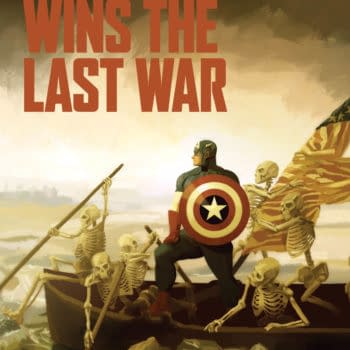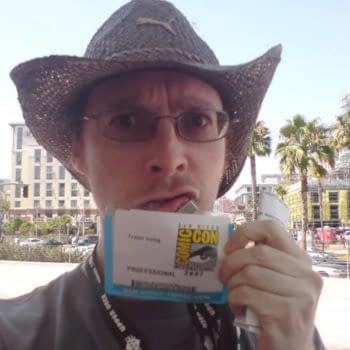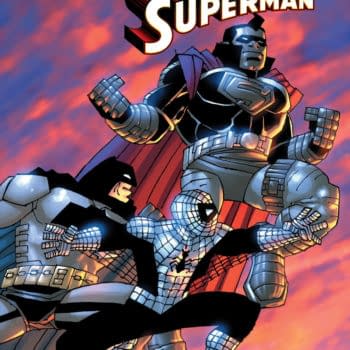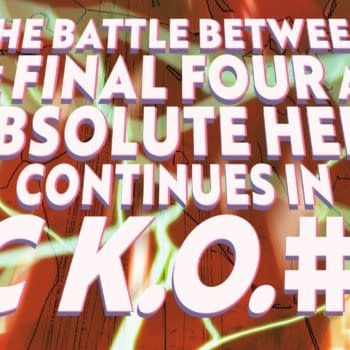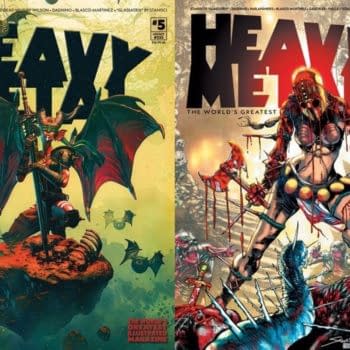Posted in: Recent Updates | Tagged: warren ellis
Interview: Jacen Burrows Talks About Crossed
But he's a choosy slut for all that. No sooner have I seen him with Warren Ellis, then he's banging something out with Garth Ennis before dumping them both for Alan Moore. Though I hear he's still seeing Alan Moore on the side.
I asked him about his experiences at Avatar, especially the current coming-to-an-end series, Crossed.
Bleeding Cool: Who has the most obscene imagination, Garth Ennis, Warren Ellis or Alan Moore? And what are the extremes of each you've been called upon to draw?
Jacen Burrows: This is a very difficult question to answer. It is quite possible that I have had the honor of drawing the most extreme comics each of them has written. Warren's SCARS has one of the most horrific things I've ever seen in any fiction and it is played totally straight. For Garth I have a hard time remembering anything in his other work that lives up to the terrible reveal we get in issue seven or the double page splash at the end of issue one of CROSSED. We intentionally went to the limits on that one. We wanted to establish the stakes for these characters early on and it was so far past most people's expectations. Alan's NEONOMICON gets just as disturbing but I don't want to give anything away. I will say this, though. It brilliantly and intentionally goes to places so unsettling that the horror of the story becomes palpable in the same way that reading H.P. Lovecraft for the first time did when I was thirteen. It sticks with you. It isn't splatter horror at all, though. You'll have to wait and see what I mean.
I'm going to give the award to Warren, though, for BAD WORLD. He made me draw a man on a step ladder fucking a dinosaur.
Bleeding Cool: Many readers have balked at certain scenes in Crossed. Have you become immune to such concerns? Do any haunt you?
Jacen Burrows: Not at all. The whole point of horror is to affect your reader. For me CROSSED was always about the nature of violence stored away inside humans that seems to surface anywhere law and order collapse. We are incredibly lucky to live the lifestyles we do in the West, particularly in the States. We're sheltered from real violence, so much so that when it occurs it shakes us to our core. But all around the world there are places where things are happening every day that are worse than anything we showed. It doesn't take a mysterious infection to make people unleash their inner monsters. I feel real horror is meant to make us look at the precarious nature of our safety which in turn gives us the perspective to appreciate what we have. That is always valid material for artistic mining.
The only comments that have ever bothered me were the ones from people who assumed we were just trying to be gratuitous without any deeper purpose. The very nature of the comic medium requires a lot of investment on the part of the reader and I can understand how some readers might not look deeper than the surface but that certainly doesn't mean there isn't a lot under there.
Bleeding Cool: What's the worst reaction you've had to a page from Crossed from an onlooker?
Jacen Burrows: Pure, unadulterated glee. The rare person who sees the worst bits and is ONLY amused? They scare me a little. I've seen my share of slack jawed shock but no one has ever tried to take me to task over the content. Most are curious or quickly come to the conclusion that this just isn't a book for them which is totally respectable.
Bleeding Cool: Do you know where Crossed is going or are you just holding on for the ride like the rest of us?
Jacen Burrows: I've read some of the scripts from Lapham's intensely good, seriously shocking CROSSED: FAMILY VALUES and heard a little bit about some of the proposed arcs for CROSSED: BADLANDS but generally, no. I have no clue where the Crossed world is going but it is developing into something bigger than I ever thought it would be when I drew the crew from Jim's Diner ages ago in #0.
Bleeding Cool: You're considered by many to be a fine comics storyteller, especially panel-to-panel flow. Are there three easy tips you can give to budding artists to improve their storytelling? The kind of things you'd tell your younger self when he was setting out?
Jacen Burrows: A lot of it comes down to personal style. I try to avoid the standard superhero trappings like having elements inside the panel overlap the panel border or having big dynamic splash images that face the reader directly. They serve a purpose in big, dynamic superhero books but the stuff I do is meant to be more grounded and cinematic. I'll use things like that for effect occasionally but they lose any sort of narrative value if you rely on them all the time. The flashier your page layout gets the higher the risk of losing casual readers. The drama and tension should be apparent in the story without having to get completely ridiculous with the layouts. Trust your writer and always put the story first. I also lean towards certain panel chapes that just feel right to me. I like page wide horizontal panels or tiers with three or four tall panels. In CROSSED I avoided full bleed images except for establishing shots or for major action as a way of clearly delineating a new setting or scene.
Study other art forms for the nuances of composition. Paintings, photography, movies, even video games. You can never stop studying these things or you'll stagnate. I'm constantly hunting through amazon for art books of old painters or other visual disciplines that might help. It takes a lot more than a knowledge of comic art to evolve beyond your limitations.
But also, never stop studying comics. Listen to who pros talk about as their major influences and track them down. Google Image search is your friend. If someone like Charles Vess mentions a classic illustrator like Arthur Rackham as a major influence, look them up. Or if a name keeps coming up as a master of the medium, like Alex Toth, Jack Kirby, Jack Davis, Walt Kelly, etc, even if you don't get it at first glance, study them till you do. There is a reason those who have devoted themselves to this discipline hold them in such high regard. If your influences only go back to mainstream comics of the 80's you really don't know the medium at all.
Bleeding Cool: How often do you have to spell out your first name?
Jacen Burrows: I generally start most conversations with new folks with the spelling, funny enough. I'm used to it at this point. I went by "Jason" all through school and now I rather like being a little different.







